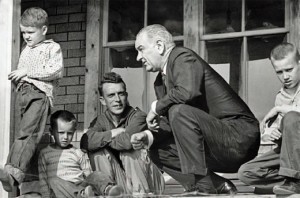War on Poverty Turns 50: Are We Winning Yet?
By Michael D. Tanner and Charles Hughes
October 20, 2014
The War on Poverty is 50 years old. Over that time, federal and state governments have spent more than $19 trillion fighting poverty. But what have we really accomplished?
Although far from conclusive, the evidence suggests that we have successfully reduced many of the deprivations of material poverty, especially in the early years of the War on Poverty. However, these efforts were more successful among socioeconomically stable groups such as the elderly than low-income groups facing other social problems. Moreover, other factors like the passage of the Civil Rights Act, the expansion of economic opportunities to African Americans and women, increased private charity, and general economic growth may all have played a role in whatever poverty reduction occurred.
However, even if the War on Poverty achieved some initial success, the programs it spawned have long since reached a point of diminishing returns. In recent years we have spent more and more money on more and more programs, while realizing few, if any, additional gains. More important, the War on Poverty has failed to make those living in poverty independent or increase economic mobility among the poor and children. We may have made the lives of the poor less uncomfortable, but we have failed to truly lift people out of poverty.
The failures of the War on Poverty should serve as an object lesson for policymakers today. Good intentions are not enough. We should not continue to throw money at failed programs in the name of compassion.
https://www.cato.org/publications/policy-analysis/war-poverty-turns-50-are-we-winning-yet?utm_content=buffera4907&utm_medium=social&utm_source=facebook.com&utm_campaign=buffer


Its a ‘failure’.
What was intended as a ‘safety net’ has turned into a ‘way of life’ for generations of people and no family values.
There is no incentive to go to work, just have another baby with a different man (who usually has zero part in the childs upbringing) and get a bigger check every month from the government.
That child, growing up in a ‘non-family’ environment without a man turns into a child of the streets, and ends up in the revolving door ‘system’ of criminals. *since there is no father to look up to, they emulate the drug dealers and gangbangers*
Illegal aliens who come here and drop an anchor baby are rewarded with welfare, housing, etc, which encourages this activity instead of shipping them back to their home country.
They system is broken, but it is a way for Democrats to get votes by keeping these people dependent on big government.
Our system of progressively taxing those with money and giving it to those who have little is basically a way of preventing, or reducing, the incentive for the more violent of them to not take it by force. Can you imagine what our streets would be like if welfare (in all its forms) was eliminated tomorrow?
#2 your point is well taken about the ‘streets’.
Since the NJ Democrats won’t allow honest citizens to arm themselves against violent criminals, we better keep them happy with welfare, section 8 housing , and EBT cards so they stay in the inner cities instead of coming here to take from those who earned what they have.
Sad, but true.